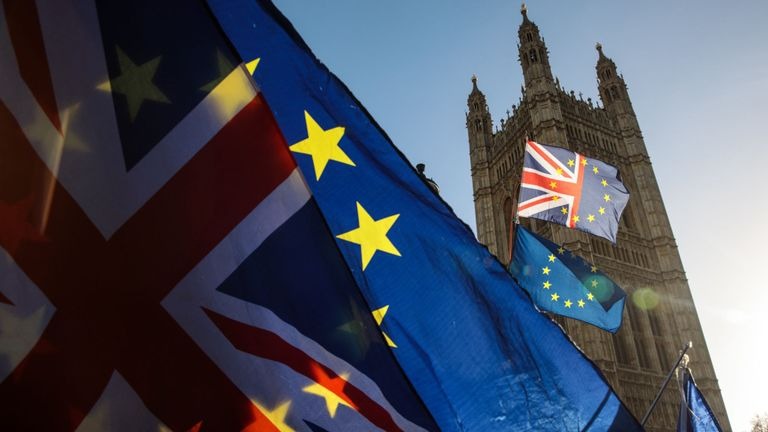As Theresa May’s slightly-tweaked EU withdrawal agreement crashed to defeat in the British House of Commons earlier this week, Brexiteers in the Conservative and Democratic Unionist parties once again joined forces with the opposition to vote against their own government. The only clear insight to be gained from the dramatic parliamentary showdown was that deep divisions persist within the ruling legislative alliance between those who still don’t want to leave at all, those who want to leave but fear major economic disruption, and those who want to leave the EU at all cost. What is less clear, is how the last group of Europhobes expects to profit from its unyielding stance.
So far, May’s preferred strategy in the face of party infighting has been to keep kicking the can up the road. Having coined masterpieces of political Dadaism like ‘Brexit means Brexit and ‘I want a red, white and blue Brexit’ back in 2016, she has successfully postponed reaching a concrete decision on how to actually proceed with the matter until the last two weeks of a two-year negotiation. It is understandable that the most confident Conservatives in the European Research Group (ERG), who want to drag their country out of the bloc swiftly and comprehensively, are irked by the Prime Minister’s legendary procrastination skills. They may soon find, however, that there is no straightforward way out of the Brexit maze that meets their demands for a clean cut with the EU while keeping what remains of their electoral reputations intact.
The immediate consequence of May’s defeat is that successive parliamentary votes were held as delegates tried to regain control of a situation which even by the standards of the tumultuous post-referendum period has become extremely chaotic. A first motion to oppose leaving the EU without a deal as a matter of principle was passed against the party leaderships wishes on Wednesday night. A second one to extend the current Article 50 deadline beyond March 29th was adopted one day later. The House of Commons has now committed to either seek a short technical extension to allow for May’s beaten-but-not-dead deal to be implemented after all, or to request a lengthy extension to chart a radically different course if no such agreement is secured by March 20th. As a consequence, dogmatic Brexiteers are now confronted with two principal threats unless they surrender their resistance and back the existing Withdrawal Agreement when it returns to the plenary for a third ‘meaningful vote’ next week.
The first and most obvious risk is that Brexit no longer happens at all. Labour’s calls for a new general election may temporarily distract from a second referendum but they are not mutually exclusive. In the midst of chaos and indecision, the window of opportunity for the grassroots Remain movement to make its ultimate gamble is larger than ever. To be sure, there are still real hurdles to be overcome. The EU has signalled its preference for a brief one-off delay of Brexit, lasting only until European Parliamentary elections in late May, and warned that a request for more time would require proper justification and unanimous consent by the remaining 27 members. Nevertheless, the political earthquake that a looming new popular vote on leaving the EU would represent might just offer sufficient cause for a lengthy extension of the Article 50 period. Although Brexiteers consider themselves guardians of democratic accountability, their hostility to presenting more than an abstract sketch of Brexit to the public for approval suggests that growing dissatisfaction with the project in recent opinion polls has not gone unnoticed.
The second, and perhaps greater risk, for ambitious pro-leave Tories like Johnson and Rees-Mogg is that delivering Brexit will prove an ungrateful task. While voicing searing criticism of May’s negotiating approach, the Brexiteers have never proposed a credible solution to resolve its contradictions.
The awkward truth underlying Britain’s clumsy departure is that there was never an exit route which was simultaneously radical and safe. In the current state of flux, it is both possible that Britain will crash out without a deal, albeit slightly delayed, or that a last-minute cross-party consensus is found which keeps the UK deeply integrated into the Single Market and Customs. The government’s own analysis shows that severing close economic ties with the bloc comes at a hefty price to domestic consumers and producers. For lack of the complete surrender of the EU27 at the negotiating table once predicted, the only way to avert such harm while actually going ahead with Brexit is to become an obedient satellite state. A not-quite-membership, like that of Norway, would enable relatively frictionless trade but also requires British policymakers and business to invest significant resources in monitoring legislative processes in Brussels and making their voices heard therein.
If May had scrapped by with her Withdrawal Agreement on Tuesday, she would have continued to serve as a deflective shield on whom all criticism for Brexit’s broken promises becomes concentrated. Yet by voting down May’s deal, the Brexiteers can no longer abrogate responsibility for what happens next as a result of their revolutionary zeal. Whether Brexit is abruptly cancelled after all or materialises belatedly in imperfect hard or soft incarnations, it is hard to imagine voters rewarding them at the next general election. Their best option may therefore be to perform a volte-face and accept the Prime Minister's deal. If they are lucky, she will then continue to shoulder the blame for carrying out a mission that is proving increasingly unpopular with the electorate as its contours become clearer.
By Philipp Requat

